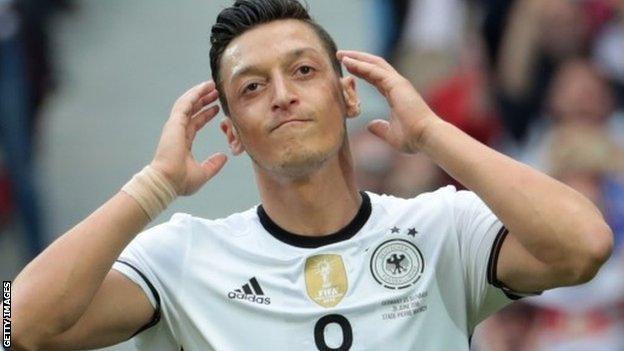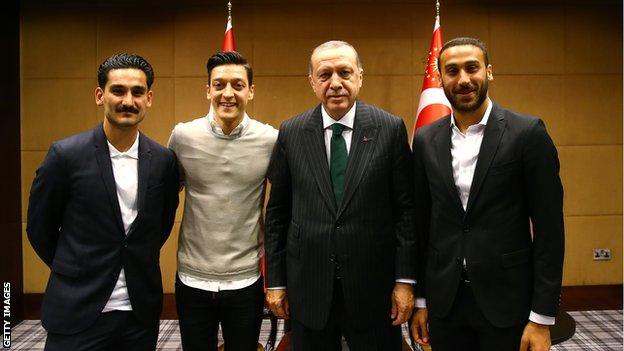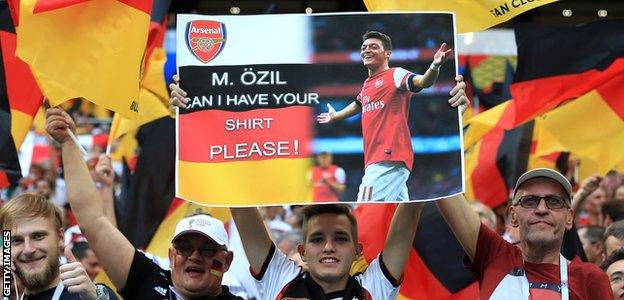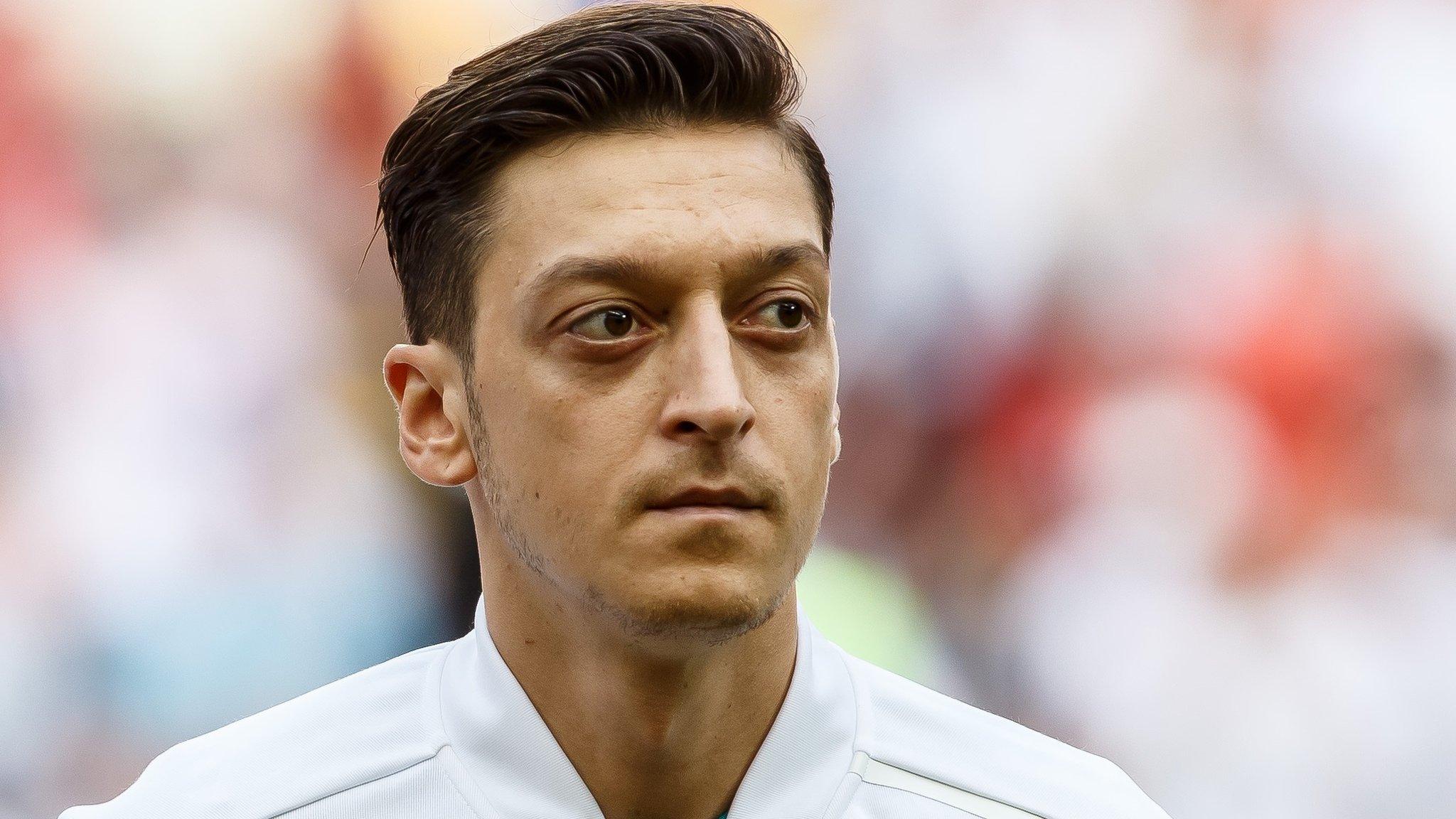Mesut Ozil: Reaction in Germany - criticism from some, sympathy from others
- Published

Ozil, capped 92 times by Germany, announced he has quit international football
Ehrenfeld is a part of Cologne, Germany, renowned for its multi-cultural community. Senol, working behind the till at one newsagents by the train station, represents just that.
About half a century ago, his family uprooted from Turkey and came to Germany as guest workers after a labour shortage. Some 60 miles up the road in Gelsenkirchen, the grandparents of Mesut Ozil did the same.
Senol, a former bodyguard, says he loves interacting with people and happily banters with his customers. "You sure you want the poisonous ones?" he says wryly to one who wants a pack of cigarettes.
Out the front stand the daily newspapers, not just from Germany but from Turkey too. On the front of almost all of them on Monday was a headline about Ozil. In the view of Senol and the locals he chats to, it's not Ozil's fault.
Why is it such a big deal?
A three-part statement from the Arsenal midfielder on Sunday ended with him saying: "I will no longer be playing for Germany at international level whilst I have this feeling of racism and disrespect."
A World Cup winner in 2014, capped 92 times by his country, he is the most influential German player at present.
That comes from being of German-Turkish descent, along with having played in Spain and England. Combine his followers on Twitter, Instagram and Facebook and you get a figure of 72 million.
For the Germany team itself, he had been an important regular. Before being dropped against Sweden for the second game of the World Cup in Russia, he had started every game at a major competition since the 2010 World Cup, his debut on the competitive global stage.
The controversy around him dates back to May, a day before Germany's World Cup squad was announced. Ozil, along with Manchester City midfielder Ilkay Gundogan, was photographed with Turkish President Recep Tayyip Erdogan.

Ilkay Gundogan and Mesut Ozil, along with Everton's Germany-born Turkey striker Cenk Tosun, pose with the Turkish president
That was dimly viewed in Germany, with Erdogan approaching another election and seen by many in the country as a dictator. Only in February, for instance, was German journalist Deniz Yucel released having been detained for a year, accused of spreading propaganda.
"Both [Ozil and Gundogan] have made a mistake but we also have to keep this in perspective," said German FA president Reinhard Grindel before the World Cup.
When Ozil did not appear at the national team's media day, he added: "If he doesn't want to answer in any interviews, then perhaps he'll do so on the pitch."
Team manager Oliver Bierhoff maintained before the tournament that the issue had been dealt with, but whistles from the crowd at Germany's final warm-up game in Leverkusen suggested otherwise.
Then came the team's worst World Cup in 80 years, with Ozil - among others - scapegoated by politicians from the country's far right, keen to make political capital from a football failure.
The reaction in Germany
After Germany's exit, Gundogan's bit-part role in Russia kept him largely out of the firing line but Grindel and former Germany striker Bierhoff targeted Ozil.
"To date with the Germany team, we have never forced something [with players], always trying to convince them instead. With Mesut, that didn't happen and in that sense, you have to consider whether we could have done without him in a sporting sense," said Bierhoff in an interview with newspaper Die Welt.
Grindel, meanwhile, said Ozil should explain himself.
By making the argument a binary one, and picking out Ozil in the process, their criticism saw them come down on the same side of the argument as those who have torn into Ozil from the country's far right.
That does not include Bayern president Uli Hoeness, but he still laid into Ozil on Monday, calling him a "poor excuse for footballer" who "hadn't made a tackle since before the 2014 World Cup".
Criticism came too from national tabloid Bild, with one comment piece titled 'enough is enough'.
Yet while a few have criticised Ozil for only pouring oil onto the fire in the debate, there has been more sympathy for the 29-year-old in the wake of his statements and stronger criticism of the DFB.
That started last week, with Hoeness' cohort Karl-Heinz Rummenigge, the Bayern chairman, defending Ozil and calling the DFB "amateurs". The association's former press officer Harald Stenger has since described Grindel as "the FA's worst president in the last 50 years" - though he did not work with him at the DFB.

In 2017, Ozil was named Germany's Player of the Year for a fifth time in six years
Beyond football
Back in Ehrenfeld, Senol thinks the whole thing has been blown out of proportion.
"The guy isn't to blame. If I was in Ozil's position, I would have also done the same and why not? He's our president. It would be the same if Angela Merkel did it too."
Senol says he doesn't support Erdogan but there is certainly some naivety on Ozil's part if he did not appreciate what the consequences of his actions might be.
That said, there could be an impact for the DFB at a lower level, as Peter Ahrens from German magazine Der Spiegel pointed out earlier this month.
"A signal that will also register with academy players from migrant families: do the DFB really want us to play for Germany? Whether talented players in the future will choose Germany without hesitation, will probably be discussed differently after the experience in how the Ozil case was dealt with."
Ozil is by no means the only player in recent German history with a second nationality. Fellow World Cup winners Miroslav Klose and Lukas Podolski have Polish roots. Sami Khedira is part Tunisian whilst Jerome Boateng is of Ghanaian descent.
Boateng came under verbal attack during the last World Cup from one right-wing politician, who said he wouldn't want the Bayern Munich defender as his neighbour. That was emphatically drowned out by responses from both the player and the public.
The Ozil issue, on the other hand, has just dragged on.
What happens next?
In a statement on Monday, the DFB praised Ozil for "shaping a successful era on and off the pitch", before defending its own work when it comes to integration and rejecting Ozil's accusations of racism.
The words 'Reinhard Grindel' were not to be found in their 472-word riposte, though. He is on holiday. There are calls already from politicians and fans for him to resign immediately.
If Ozil is to play for Germany again, that would likely be the first step towards that.
As long as Bierhoff remains team manager, and even Joachim Low as coach, it's difficult to see his international career continuing.
In the words of Senol: "That's a shame. He's a good lad. He's a good football player and now they've lost a good footballer."
- Published23 July 2018
